- Bernard Preston homepage
- Our green garden
- Carbs Galore Lets Enjoy Corn Wholemeal Bread and Beans
Carbs galore: Let's enjoy corn, wholemeal bread and beans
Carbs galore, let's enjoy corn, wholemeal bread and beans from our own gardens. It raises important questions about starches; can they actually be healthy?
There are carbs galore from our green garden in mid-summer; should we be avoiding them?
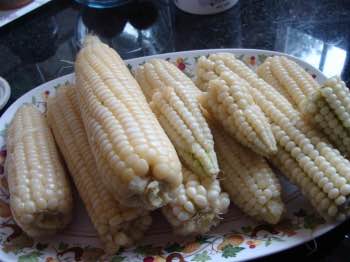
Those of you who read this column with any regularity will know that I do not advocate avoiding all carbs; except in the case of those who are morbidly obese. Diabetics must choose with care and keep the load down. That means small helpings; perhaps just half a cob of corn.
More specifically it’s the refined carbs that do the damage. Beets and cane are good; sugar is bad. Whole corn is fantastic; super-refined maize meal is awful. Wheat is a wonder food; cake flour is the great deceiver. Potatoes from cold storage make you fat; even diabetics can enjoy new spuds in moderation.
Whole grains
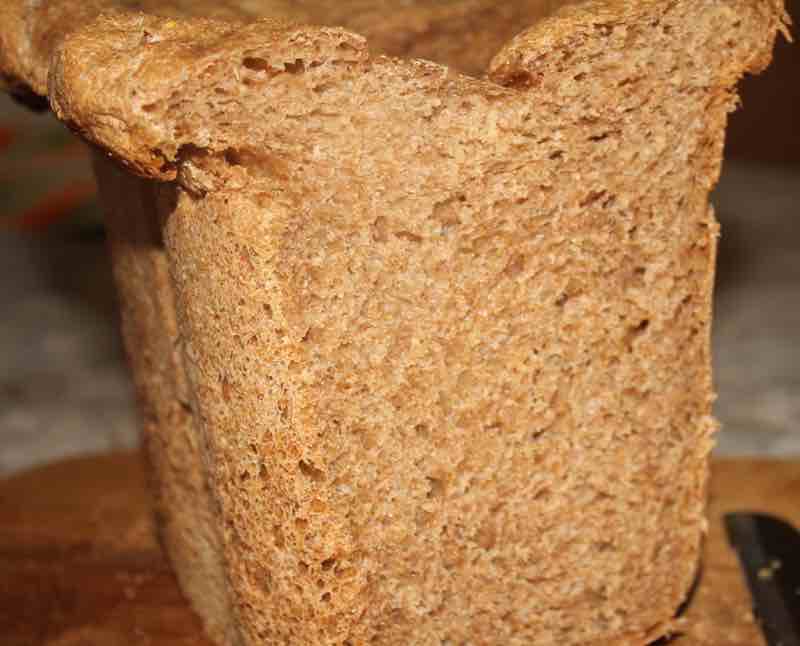 You will not find sourdough made with 100% wholemeal in the grocery store
You will not find sourdough made with 100% wholemeal in the grocery storeThere is a huge amount in the literature about the benefits of whole grains; the difficulty is that they are extremely difficult to get, so they are lumped in with the bad carbs. At all levels of society including researchers and nutritionists they assume you simply will not be able to find them; they are not far wrong.
From our green garden we have an abundance of food right now; meals that the followers of the ketogenic diets think we should shun. As always you have to read the fine print; there are difficulties with carbs but oversimplification of the issues is not helpful. Avoiding whole grains, if you find them and legumes because of their starch content is perilous, in my opinion.
But there are issues with carbs that we do need to clearly understand. It's an obese world, where the great majority are suffering and dying from “non-communicable diseases.” Those are the ones mostly that are killing us; heart conditions, stroke and diabetes.
And in fact over half of those dying from Covid are obese too.
One carb at a meal
If you refine a carbohydrate it will raise your blood glucose, stress your pancreas and liver; and make you insulin-resistant. It will likely put on those unwanted kilogrammes.
Right now we are faced with a glut of healthy carbs at our green home; it’s making me stop and consider. I have come to the conclusion that those who stress no more than one starch at a meal are probably spot on. If you have wholegrain grits porridge and Eggs Hilton on toast for breakfast, you will feel bloated; go without the bread.
Carbs galore: Let's enjoy corn, wholemeal bread and beans
A mealie and a slice of wholegrain bread for lunch is just too much.
Potatoes and a pudding for supper are over the top. The other option, a
good one is half a helping of each; reduce the glycemic load.
Yes
it’s all about “glycemic load.” We need to keep even the good carbs
under control. Enjoy them in small amounts without guilt. They are
healthy, providing fibre for the friendly bugs in the intestine and bulk
for the stool; and a plethora of important vitamins and phytonutrients.
Beans and peas
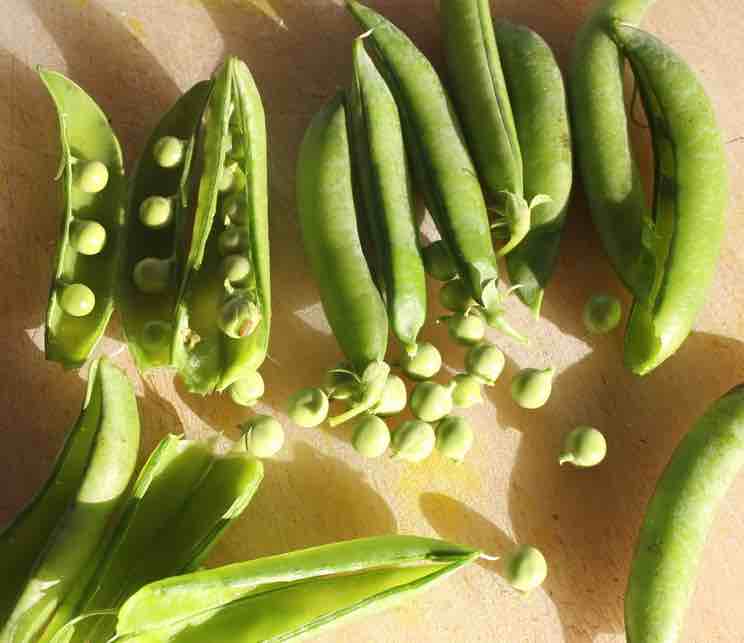 Rhizobia on the roots of peas capture nitrogen to make vegetable protein.
Rhizobia on the roots of peas capture nitrogen to make vegetable protein.We are going dizzy with the choice of healthy carbs right now. New potatoes are delicious; wholegrain bread is so good you don’t need anything more than butter on it. It tastes wonderful. Freshly-ground maizemeal straight from our little mill makes a satiating breakfast; corn on the cob. And quite soon it will be butternut and lima beans; a nightmare for those who are trying to bant.
Yes it’s complex; that is why there is so much controversy. Do enjoy a mealie for lunch right now, without guilt but do keep the load down. That probably means no bread; have a green salad instead.
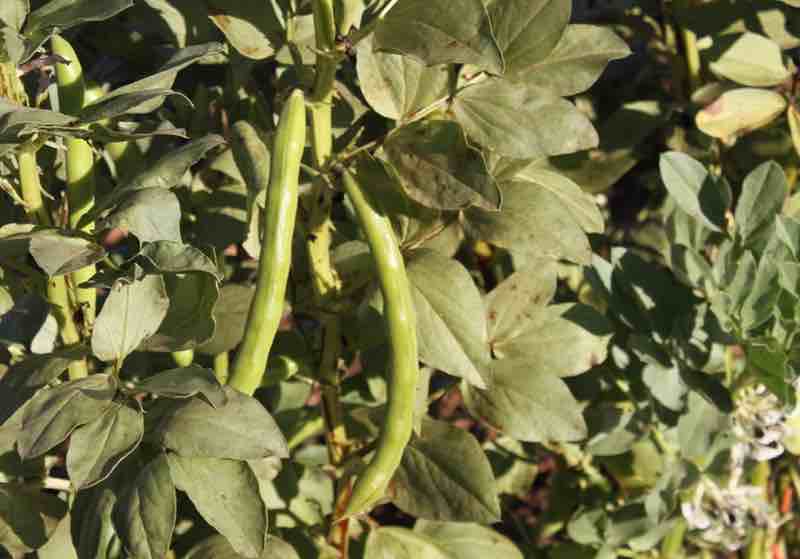 Broad beans and longevity
Broad beans and longevityDo start thinking about where you could plant some broad-beans and peas; they are full of nourishing protein and some carbohydrate. Make the decision to strictly limit sugar and cake flour for ever; they are the very devil.
Gardeners who want to grow broad beans and peas need to learn about rhizobia. Added to the soil they provide nitrogen for the plant, greatly increasing the yield of the element for the amino-acids that make up protein.
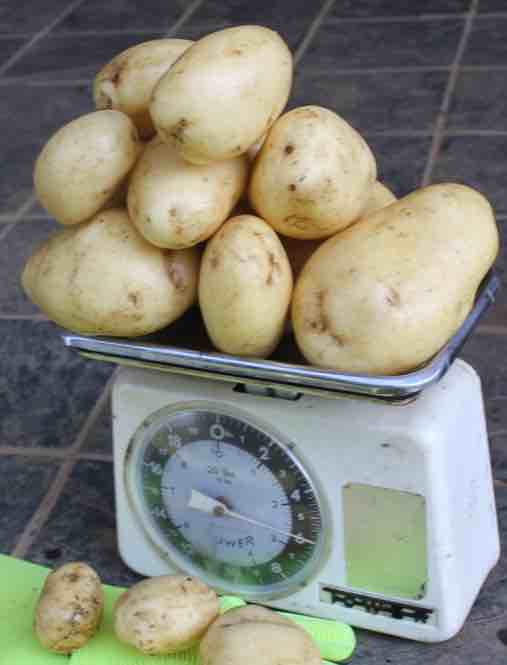
Is eating healthily expensive?
Many people say, mistakenly I believe that it is too expensive to eat healthily; they think they just cannot afford it. I contend that its refined food that is really costly.
For example, 1kg of maize costs me R4.20. Turn it into cornflakes and the price rockets to 68.99 per kilogramme at the Village Spar.
New potatoes are healthy carbs
Two potato plants lifted this afternoon yielded 3kg of organic new spuds of a quality you’ll find extremely difficult to purchase; half of the carb is resistant starch. The real cost is the sweat off your brow; a massive amount of good food.
Many of course reading this will heap scorn on what I have written. So be it; we live and die by the choices we make. Incidentally we have not put on an ounce this summer; in fact I have lost 1kg. Sawing and splitting timber from a fallen tree has helped. Again, it’s the sweat off your brow.
Researchers found that just three minutes of moderately vigorous exercise with a starchy meal greatly improved blood glucose and insulin levels; and after supper is the most important.
I wonder what the effect of exercise before the meal would be?
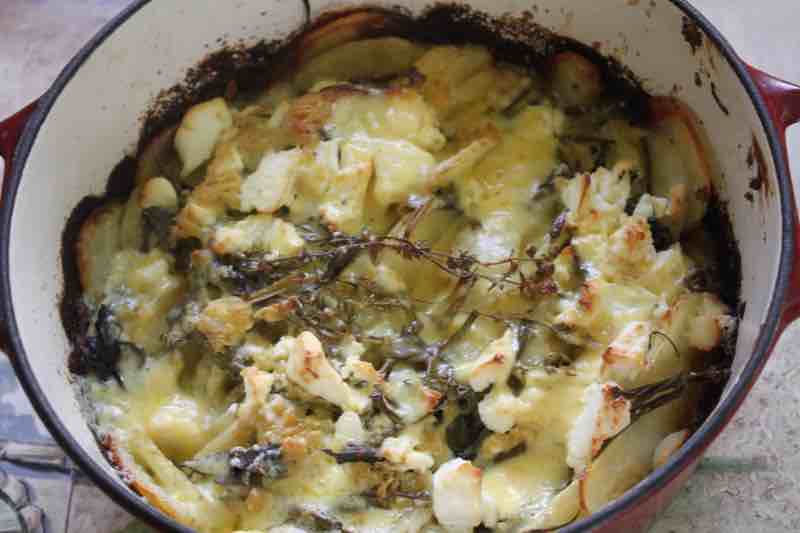
In America literally millions of people have started growing their own food for the first time, making health a priority. That’s important obviously but the massive savings of reaping your own fruit and veggies are just as significant; not forgetting the joy of picking your own lettuce and lifting new potatoes.
Should we be doing less in South Africa where extreme food anxiety affects one in ten families?
This traditional Swiss rösti recipe has a soft fluffy centre but is golden and crispy on the outside. The research is strong; organic new potatoes are extremely healthy food. That is especially true as you do not need to peel them; they have ten times the antioxidants of those from cold-storage.
There is absolutely no need for those with a small piece of ground to go hungry; or suffer from malnutrition and stunting.
It’s purely anecdotal and of no scientific value but we are firmly convinced that this way of living and eating is why we take no medication whatsoever; and have not seen our doctor for over a year. That is unusual for a couple midway through their eighth decade.
That’s where the real savings are; wellness. These are principles we have learned from those living in the five Blue Zones of the world; where ten times as many people live into vigorous, healthy old age.
A study of blue zone longevity has made a profound impression on us.
Blood glucose and exercise
Carbs galore, particularly if they are refined, will certainly have an effect on blood glucose levels and insulin sensitivity.
Researchers gave 30 people a sugary drink and then asked them to walk up and down stairs for one, three or ten minutes; and then tested their blood glucose and insulin levels again.
Just three minutes of moderate exercise stopped the risk of high blood glucose and lowered insulin concentrations.
After ten minutes of stair climbing insulin sensitivity was markedly improved. The take-home from this is that a short walk after every starchy meal has enormous benefit; particularly if it's up or down hill.
Type 2 diabetes and carbs
Insulin produced by the pancreas is the body's response to carbs galore, should blood-sugar soar into the stratosphere.
This is what happens in type-2 diabetes when our cells are unable to respond to the hormone; so the pancreas has to produce even more. It is known as insulin resistance.
This happens especially to the obese who have been eating far too many refined carbs; repeated surges of blood glucose over the years cause them to become insulin-resistant.
Unrefined grains, legumes and new potatoes[2] are unlikely to have this dramatic effect on blood glucose; neither do they make us obese. That is why we have invested in a corn flour milling machine that does not separate the germ and bran from the meal.
It's interesting that the longevity diet has no concerns about whole grains and legumes; in fact they are strongly recommended. Carbs galore are not the problem; it is the refined starches like cake flour and sugar that we should fear. Uncontrolled diabetes is a monster.
"High intake of refined carbohydrates and added sugars is clearly associated with increased risk for cardiometabolic diseases."
- Tufts School of Nutritional Science
Being PC
One of the characteristics of the Dutch that I so love is their directness. Initially it comes across as being rude and abrupt until eventually you realise it's a more honest way of life. Being PC actually encourages us to live the lie.
Obesity is probably the most serious condition to ever hit planet Earth. It undermines every part of the body as the pandemic is revealing; causing type-2 diabetes, inflammation and disability.
“Political correctness is the natural continuum from the party line. What we are seeing once again is a self-appointed group of vigilantes imposing their views on others.”
- Doris Lessing
Raising the subject on any forum is now being described as "fat-bashing;" absolutely avoid religion, politics and obesity in conversation. It's not your concern if your severely overweight young friend is likely to lose more than ten years of his life[4].
One half of the population has been completely hoodwinked into thinking that refined carbs like cake flour and sugar are perfectly normal food.
The other half is being equally misled that all carbs are bad and must be completely avoided.
Yet the science strongly points out that whole carbs are extremely healthy; avoiding peas, beans and corn on the cob is just so much nonsense. Our minds have been completely captured by food companies and the peddlers of the ketogenic diets.
In between these two polarised groups we believe that carbs galore is a fundamentally healthy way of living.
For the obese for a period they will have to limit even the good carbs if they want to avoid pain, disability and an early death. Should we be talking it up or looking the other way and let them go unhappily on their way to oblivion?
GERD, obesity and carbs
Gastro Esophageal Reflux Disease is a common distressing condition; more than one in five people on the so-called Industrial Diet are likely to suffer from it. The acidic gastric contents are regurgitated resulting in heartburn and sometimes erosion of the lining.
Chronic conditions may lead to Barrett's oesophagus; cancer. It affects roughly 10% of those suffering from GERD.
Obesity is a significant risk factor; more than double the likelihood of GERD and its complications.
GERD is associated with food that is high in carbs and fat, especially at night. Alcohol is another contributory factor. During the day gravity plays its part in keeping the gastric contents where they belong; in the stomach.
Ironically "delayed gastric emptying," generally considered highly desirable, may contribute to the heartburn. Thus it is not advisable to eat unrefined carbs or the fat often recommended with the keto diets at night.
Dinner should be enjoyed at least three hours before bedtime.
Unrefined whole carbs galore may be advisable during the day but certainly not at night. Bread and a rich fatty soup are not sensible. Several glasses of wine or beer are likely to aggravate the problem still further; and cause sleepless misery for several hours. I know because I have T-shirt.
Of anecdotal value only eating chaote squash for supper, known as a susu in South Africa dampens all the nasty symptoms. But very few people grow them or even know what they are.
Gentle exercise after dinner certainly helps too; the Swedish walk.
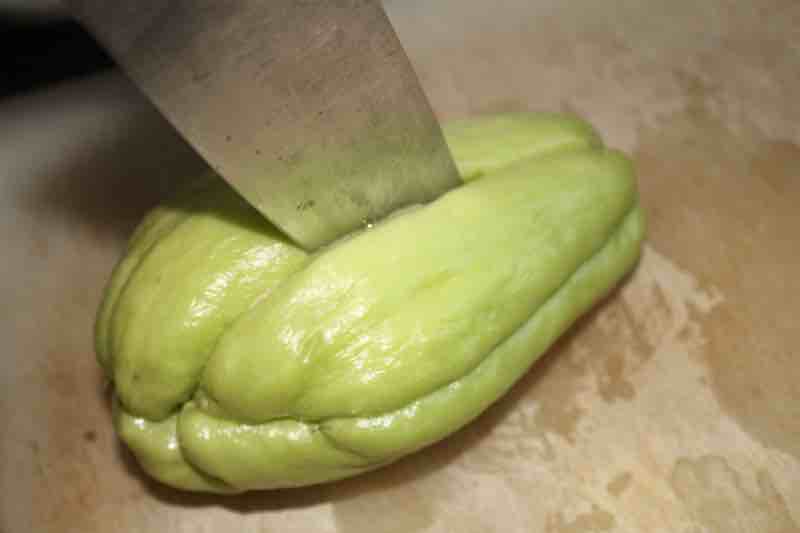 The susu relieves heartburn.
The susu relieves heartburn.Food choices get worse
Research shows that three-quarters of the products in grocery stores is ultraprocessed; we are reluctant to call most of them food. That's where the profit is; they are far more expensive than wholesome meals.
Add to that the fact that most fruits and vegetables are grown in soil laced with ecocides like Roundup and sprayed with toxic chemicals to kill molds and insects. It is little wonder that cancer, neurological and auto-immune diseases are spreading like wildfire.
Life may be getting longer but the "health span" is being severely shortened.
"It has been estimated that 20% of Medicare beneficiaries have five or more chronic conditions; and fifty percent are taking 5 plus drugs."
Carbs galore: Let's enjoy corn, wholemeal bread and beans
Carbs galore: Let's enjoy corn, wholemeal bread and beans. It raises important questions about starches from our food; get moving after a meal that is high in grits, pasta or potatoes too. Just ten minutes would have huge benefits.
When browsing use right click and "Open Link in New Tab" or you may get a bad gateway signal.
Newsletter
Our newsletter is entitled "create a cyan zone" at your home, preserving both yourself and Mother Earth for future generations; and the family too, of course. We promise not to spam you with daily emails promoting various products. You may get an occasional nudge to buy one of my books.
Here are the back issues.
- Lifestyle and ideal body weight
- What are ultra-processed foods?
- Investing in long-term health
- Diseases from plastic exposure
- Intensive lifestyle management for obesity has limited value
- A world largely devoid of Parkinson's Disease
- The impact of friendly bacteria in the tum on the prevention of cancer
- There's a hole in the bucket
- Everyone is talking about weight loss drugs
- Pull the sweet tooth
- If you suffer from heartburn plant a susu
- Refined maize meal and stunting
- Should agriculture and industry get priority for water and electricity?
- Nature is calling
- Mill your own flour
- Bake your own sourdough bread
- Microplastics from our water
- Alternative types of water storage
- Wear your clothes out
- Comfort foods
- Create a bee-friendly environment
- Go to bed slightly hungry
- Keep bees
- Blue zone folk are religious
- Reduce plastic waste
- Family is important
- What can go in compost?
- Grow broad beans for longevity
- Harvest and store sunshine
- Blue zone exercise
- Harvest and store your rainwater
- Create a cyan zone at your home
Did you find this page interesting? How about forwarding it to a friendly book or food junkie? Better still, a social media tick would help.
- Bernard Preston homepage
- Our green garden
- Carbs Galore Lets Enjoy Corn Wholemeal Bread and Beans
Address:
56 Groenekloof Rd,
Hilton, KZN
South Africa
Website:
https://www.bernard-preston.com